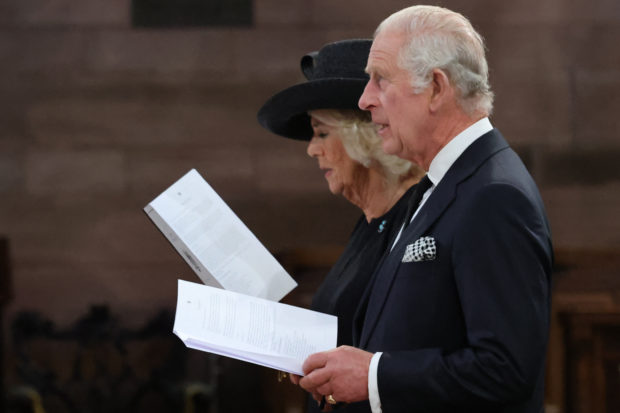
Britain’s King Charles III and Britain’s Camilla, Queen Consort attend a Service of Reflection for the life of Queen Elizabeth II at St Anne’s Cathedral in Belfast on September 13, 2022, during his visit to Northern Ireland. AFP
LONDON — A fusty anachronism or valid head of state? Charles III faces a generation of younger Britons skeptical about him as king and more questioning over the future of the monarchy.
At a packed pub in the popular Soho district, the death of Charles’ mother, Queen Elizabeth II, didn’t stop younger Londoners from enjoying themselves this weekend.
“I don’t look forward to King Charles,” Joseph Curran, 28, told AFP over the hubbub of music and chatter.
“But what’s the alternative?”
Around the table, Lucy, 29, was far more categorical in her desire to see King Charles as the last monarch.
“I look forward to that,” she said.
At 73, King Charles became the oldest sovereign to ascend to the throne in British history after the end of his mother’s record-breaking seven-decade reign.
The yawning age gap is hardly expected to endear him to his younger subjects.
In a poll published by YouGov in May, only 29 percent of 18-24-year-olds said they thought Charles would do a good job as king.
A popularity ranking of royals put Charles in lowly 12th among millennials — far below Queen Elizabeth in first place and the glamour of Kate and her husband Prince William, Charles’ eldest son, in second and third.
‘Not the same energy’
A fresh poll in the wake of Queen Elizabeth’s death saw King Charles’ approval rating among Britons rise sharply — but not everyone was too impressed by his first days in the job.
“From what I’ve seen from his new speeches, he’s not giving me the same energy that you would get from the queen,” said 21-year-old Sam.
Charles’ popularity has suffered from scandals over the decades, and was hit hard by his acrimonious split from ex-wife Diana, who died in a car crash in 1997.
More recently the royal family has been knocked by accusations of racism and insensitivity levelled by King Charles’ younger son Prince Harry and his wife Meghan since they split off to start a new life in the United States.
“Of course, as you live into your seventies, you don’t have the easy appeal you have in your thirties and forties,” said royal expert Richard Fitzwilliams.
He conceded that King Charles has had “ups and downs” with the public over the years but insisted that he actually had a “remarkable” record helping hundreds of thousands of vulnerable young people through his charity The Prince’s Trust.
One subject on which the new sovereign could strike a chord with younger Britons is ecology and the climate crisis — something King Charles has been passionate about for decades, long before it shot up the agenda.
“I think that his voice could be heard, he could have a real impact on our government and politicians,” said Connor Adams, 22.
Adams is too young to have known the bitter times of the 1990s Diana break-up and insists that in recent years, King Charles has “always been a gentleman”.
#NotMyKing
It remains an open question if this shared concern for the environment can win over his younger subjects.
Yet another poll in June showed that roughly the same number (31 percent) of 18-24-year-olds wanted to see an elected head of state as those who wanted to keep the monarchy (33 percent).
After the death of Queen Elizabeth at the age of 96 on Thursday, social media saw a spike in the use of hashtags such as #NotMyKing, which was tweeted more than 63,000 times.
But some doubt that getting rid of the monarchy would work in a country so wedded to its traditions.
“I am an advocate of republicanism, but the British version, I’m sure, would be a catastrophe!” said Curran as he sipped his drink in a pub.
“Charles has hinted at a reduced role for the monarchy, on the Spanish or Danish model. That sounds good.”
Nick, 32, said he “wasn’t optimistic” when Charles took over as head of state.
But his first impressions have been positive and he thinks “we need to work to preserve what the queen worked for”.
“We need the monarchy to evolve. Let’s try to maintain the values,” he said.
RELATED STORIES
King Charles III makes first address to UK parliament
King Charles III notes ‘heavy responsibilities’ in accession declaration